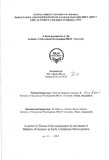| dc.contributor.advisor | Khanom, Ferdousi | |
| dc.contributor.advisor | Ahmed, Dr. Manzoor | |
| dc.contributor.author | Hoque, Jabadul | |
| dc.date.accessioned | 2018-03-27T05:38:49Z | |
| dc.date.available | 2018-03-27T05:38:49Z | |
| dc.date.copyright | 2014 | |
| dc.date.issued | 2014-04-30 | |
| dc.identifier.other | ID 12155010 | |
| dc.identifier.uri | http://hdl.handle.net/10361/9748 | |
| dc.description | This thesis is submitted in partial fulfilment of the requirements for the degree of Masters of Science in Early Child Development, 2014. | en_US |
| dc.description | Cataloged from PDF version of thesis. | |
| dc.description | Includes bibliographical references (page 50 - 55). | |
| dc.description.abstract | Children living in the street are an increasing phenomenon in developing countries.
As in other developing countries, there has been a rise in street children population in
the urban areas of Bangladesh. Street children all around the world are the most
vulnerable and excluded in society. Their rights are continually violated. Life for
street children is a painful experience. However, of most research on the situation of
young adolescents, a very few studies analyze how life on the street is experienced by
young children. Thus the objective of the study was to explore the perceptions and
experiences of 6-8 years old street children about becoming and continuing as street
children in Dhaka city as well as their felt needs and future expectations.
This was an exploratory qualitative study for which the case study method was
followed. Study area was Gubtali of Dhaka city. Data were collected through in-depth
case studies and informal observation. The study used purposive sampling method in
selecting the sample. Two groups of street children- "on the street" (who return to
family at night) and "of the street" (who stay on the street) were selected, two in each
category. Two were boys and two were girls.
According to the findings of the study, poverty was the main underlying cause for
choosing life on the street by the young children. Poverty was created due to broken
family, being orphaned and homeless due to natural calamity. Lack of parental care
was another cause. Moreover, some parents sent their children on the street for
additional earning. The study found that all of the children studied earn either by
begging or collecting wastes or by doing both. The study revealed that children of the
street struggle more than children on the street for their survival. Though different organizations are working for street children, most of the services for them were out
of their reach. It was found that children in the study did not consult doctor for any of
their illnesses due to lack of money. It was also found that foods, shelter, education
and health care were their common greatest needs. Most of the street children wanted
to be educated and to work in the garments factory to earn a living.
Children are the hope and future of our society, but street children and their future are
at risk. Street children are often perceived in a negative light. Children are on the
street not because of their fault but for the fault of society. The government and other
stakeholders should implement the conventions on child rights as well as the national
plan of actions to protect fundamental rights of children, including street children. In
addition, services/ intervention programs initiated by GOs, NGOs and INGOs should
be available for all young street children to ensure their rights, promote their wellbeing
and to help them become self-supporting. | en_US |
| dc.description.statementofresponsibility | Jabadul Hoque | |
| dc.format.extent | 62 pages | |
| dc.language.iso | en | en_US |
| dc.publisher | BRAC Univeristy | en_US |
| dc.subject | Street children | en_US |
| dc.subject | Dhaka city | en_US |
| dc.title | Young street children in Dhaka: perceptions and experiences of 6-8 year old children about life as street children in Dhaka city | en_US |
| dc.type | Thesis | en_US |
| dc.contributor.department | Institute of Education Development, BRAC University | |
| dc.description.degree | M. Early Child Development | |

